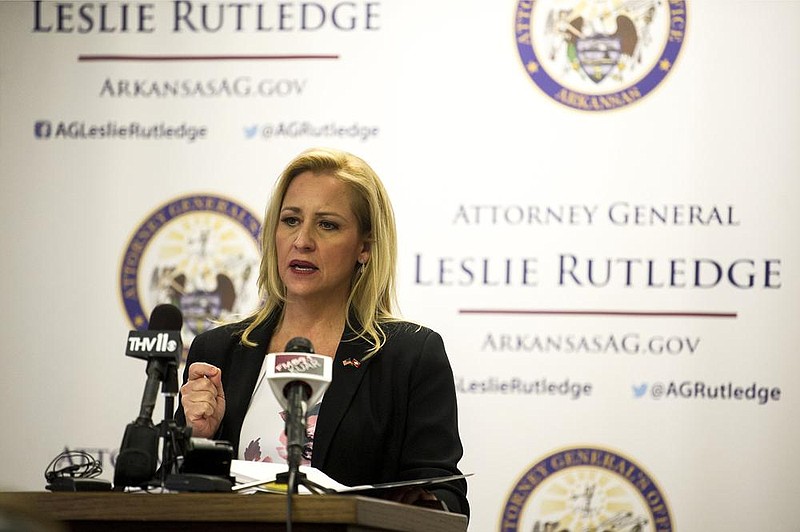As Arkansas residents prepare to choose a new attorney general in 2022, the state's highest court is being asked to make a ruling that would help establish the parameters of the constitutional officer's authority.
The question before the Arkansas Supreme Court is: Can Leslie Rutledge, the state's first Republican and first woman attorney general, be sued for the way she runs her office?
Raising the question is a group of Democratic voters, most of them from Little Rock, who have banded together to sue Rutledge, claiming she's abused her authority -- and illegally spent tax money to do it -- to promote her own political ambitions.
So far, the two lower court judges who have presided over the year-old litigation -- Alice Gray and Chip Welch of the Pulaski County Circuit Court -- have rejected Rutledge's efforts to dismiss the suit, ruling that the group has made a strong enough case to take the litigation to trial. Welch rejected Rutledge's claims of immunity in September, bringing the case to where it is now, before the high court on an appeal by Rutledge.
Arkansas voters will select Rutledge's potential successors in the May political primaries before deciding on her replacement in November. The term-limited Rutledge is seeking the lieutenant governorship this year.
Rutledge asserts that since the attorney general position was established by the Arkansas Constitution, sovereign immunity means she cannot be sued. Further with her duties established by law, Rutledge's lawyers assert that, absent proof of wrongdoing, the courts cannot tell the attorney general how to operate -- the only ones who can put restrictions on the authority of the position are legislators, who write the law, and the voters who decide who holds the office.
Rutledge's supporters and lawyers have denounced the litigation as a political stunt.
"This really should be an open-and-shut case resulting in quick dismissal of plaintiffs' claims. This is a campaign-season lawsuit brought by political opponents of the attorney general," Assistant Solicitor General Michael Cantrell wrote in pleadings to the high court. "[The litigation] challenges the attorney general's practices ... that are unquestionably within the office's broad common-law and statutory authority and which holders of the office from both major political parties have undertaken."
The plaintiff group -- Elaine Dumas, Pratt Cates Remmel Jr., Gale Stewart and Jackie Simpson of Little Rock; Michael Dougan of Jonesboro; Glen Hooks of North Little Rock; Robert Leflar of Fayetteville; and Harvey Joe Sanner of Des Arc -- has about two weeks to respond to Rutledge's arguments before the high court, according to the scheduling order.
Justices denied a request by their attorney, Richard Mays of Little Rock, to expedite the proceedings. The high court's schedule for the appeal puts the case on track to be resolved next month, barring any extension to the briefing order. However, Rutledge's attorneys have requested a chance to personally present their case to the justices in oral arguments.
The plaintiffs group claims that Rutledge has no legal justification, only her political ambitions, to intervene in out-of-state lawsuits involving the presidential election and the National Rifle Association, among others.
According to the suit, Rutledge also has been using a public-service advertising campaign as a shadow effort to promote her run for higher office. Further, the suit claims her participation in groups supporting former President Donald Trump, such as the Lawyers for Trump and The Rule of Law Defense Fund, was illegal. They want the court to force Rutledge to repay the state whatever her office has spent following her orders.
The plaintiffs might not like the way she does it, but Rutledge, just like her predecessors as the lawyer for the state, has been upholding the attorney general's obligations to Arkansas voters by trying to protect what's important to them, Rutledge's lawyers say.
In Rutledge's tenure, her lawyers said, she's tried to ensure election integrity, safeguard Second Amendment gun rights, educate voters about consumer rights and protect residents from fraudulent business practices, among other things.
"Because the challenged acts are firmly committed to the Attorney General's discretion by the common law, the Arkansas Constitution, laws enacted by the General Assembly and signed by the Governor, and this Court's own precedents, the circuit court incorrectly applied the law, and this Court should reverse its decision with instructions to dismiss the amended complaint," her lawyers argue.
